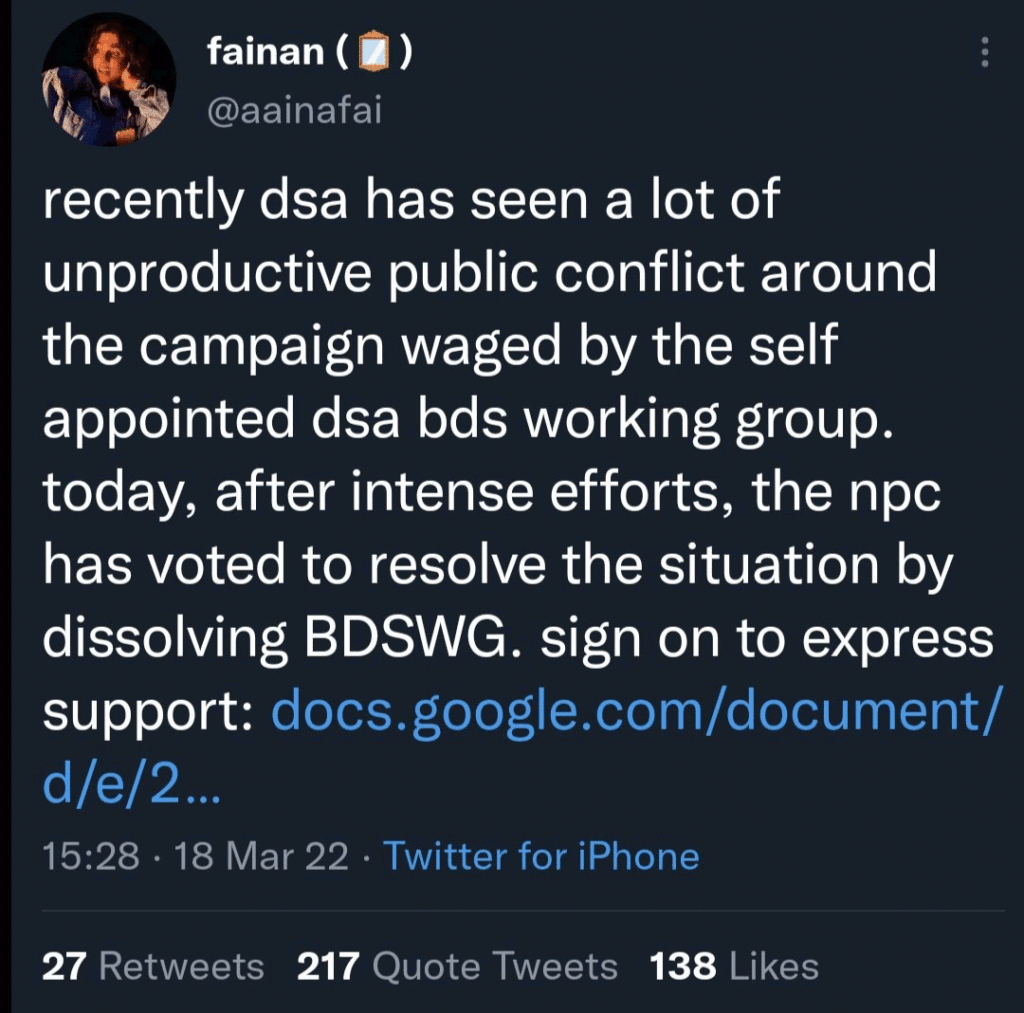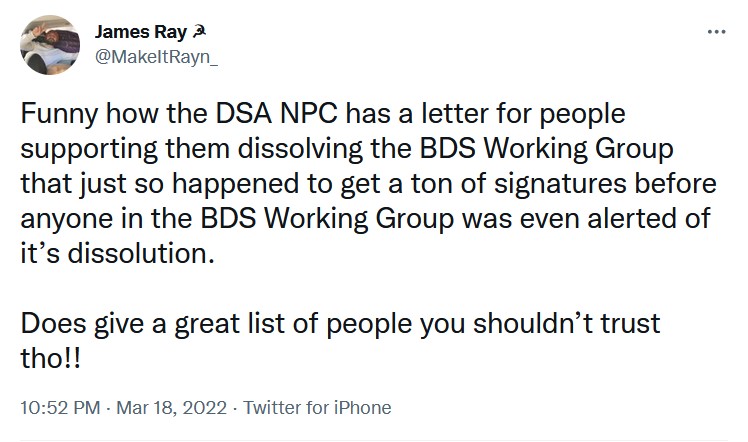On Friday, March 18 at about 5 pm Eastern, the DSA National Political Committee (NPC) announced that they had revoked the charter from the BDS and Palestine Solidarity Working Group (BDSWG) and that the leaders of the BDSWG were to be suspended for one year. The NPC’s rationale was posted on the DSA Discussion Board (a closed forum for DSA members only), where they explain that a tweet the BDS Working Group Twitter account made “contained misinformation about what Bowman’s office told DSA in an off-the-record meeting and that it violated the Code of Conduct“. They go on to say that they requested passwords to the BDSWG’s social media accounts, that the working group did not comply, and therefore they were de-chartering the group and disciplining its members. The duties of the working group would be charged to the DSA International Committee from now on.
A letter and petition, “In Support of Our Elected Leadership“1, clearly orchestrated in advance of the NPC’s announcement; it was released half an hour later by Fainan L with about two hundred signatures ready to go. The letter claims that the BDSWG attacked individual members of DSA and “wag[ed] a campaign to undermine the NPC’s decision not to expel Jamaal Bowman.” It laments, in sum, that the Bowman Affair embarrassed DSA and that the NPC had to deal with the dissent, when they have more important things to do. The majority of the letter’s signers (at this time) also signed the “For Unity, Not Unanimity” against Bowman’s expulsion, so despite giving a tip of the hat to “Whatever one’s position on the calls to expel Jamaal Bowman from DSA”, this clearly draws on the pool of people who fought against discipline for Bowman – no surprise there.


The NPC’s decision passed by a simple majority with a single vote: 9 in favor, 8 opposed — a decision that was reached nearly a month before the announcement (2/23/22). NPC members Jenbo, Kara H, and Jen M released a “Letter of Dissent Regarding the NPC’s Recent Decision on the BDS & Palestine WG” on the DSA discussion board. There they contested the NPC majority’s account of events2:
In February, after the new lines for Bowman’s district were announced, Bowman removed his co-sponsorship and many of our comrades on the NPC were quick to take victory laps and claim credit for “successfully negotiating” this move in an attempt to denigrate the BDS WG’s call for action. They even went so far as to declare it a “critical move for Palestinian liberation.” This was a mockery of the Palestinian struggle wherein national leadership used Palestinians as a tool to stroke their own egos.
The BDS WG responded by posting on Twitter calling out the mischaracterization of events. The tweet thread was immediately met with censorship demands by the NPC, which had no social media policy in place at the time…
To be clear, our minority bloc in the NPC supports national bodies sharing their social media keys with the National Communications Director for account recovery purposes. Our comrades in the BDS WG also seem to agree, as they have since handed over their passwords to staff. However, we (the undersigned NPC minority and the BDS WG) oppose demands to censor a national body’s speech, especially Palestinian speech, and especially with no transparent process or explanation. By contrast, the majority of the NPC appears to have a shared interest in wanting the BDS Working Group censored and/or dissolved.
Regardless of the BDS working group ultimately complying with the national committee criteria, the NPC majority decided to move forward with punishment in order to use their authority over them to set an example and force DSA discourse.
A further account from one member of the BDSWG explains in detail how the working group functioned, its repeated attempts to work with Bowman (including some details of the meeting between the NPC, BDSWG, Lower Hudson Valley DSA, and the Congressperson), and the NPC’s moves behind the scenes. (To read in full, one must be a DSA member and opt into the discussion board.) In sum, the BDSWG complied with the request to turn over their social media account access, and they were punished anyway.
The completely upside down response to this situation has created an outrage among DSA members: a politician who literally voted for billions of dollars of military funding towards apartheid has no accountability and is actually protected by the leadership, and the working group that was chartered by a convention to execute the organization’s stated position in favor of boycott, divest, and sanctions, is disciplined and disbanded — by one vote using a simple majority. (Bowman also issued a statement on March 9th saying he still supported the Iron Dome — which blows up any argument that the BDSWG was misrepresenting his views on the topic.)
Austin G. resigned both from the NPC and DSA as a whole, issuing a letter where he explained that the leadership and grievance system are fundamentally broken in the organization.
There can be no clearer example of this broken dynamic (and the manifest contempt for the organization’s internal democracy) than the egregious treatment of the BDS Working Group. For all the talk of a ‘democratically accountable leadership’ and ‘respecting democratic norms’, a narrow majority of the NPC decided that it was within their purview to summarily de-charter a body that was created by resolution at the 2019 National Convention. Their excuse for de-chartering this working group and folding its work into the International Committee (something that was not discussed with the IC’s leadership before this happened) is venal legalism designed to conceal what actually drove this: a desire to prove their ‘leadership’ by disciplining any groups within DSA that do not tow their line or happen to cause them any level of embarrassment in the media, at the expense of silencing Palestinian organizers and damaging DSA’s credibility within the broader left. What’s worse, this narrow majority organized a public letter of support for this decision in advance of the decision being announced while stringing along the Working Group’s steering committee for a month. This is unprincipled and unconscionable behavior, but sadly is the table stakes for DSA’s internal political culture.
Membership has responded sharply, with a mix of resignations and open opposition. A petition launched on Saturday, March 20th (“For an internationalist DSA“) has already gathered nearly one thousand signatures and twenty organizational endorsements. The petition lists four demands:
- We demand the NPC reinstate BDS WG with its previous leadership, and lift the ban on national leadership placed on them.
- We demand the NPC affirm the right of lower bodies—including all chapters, working groups, standing committees and caucuses—to publicly criticize higher bodies, up to and including the NPC. Without open criticism, our democracy will wither and die.
- We commit to the struggle for a liberated and democratic Palestine, and to the merger of socialism and anti-imperialist movements across the world. We will work toward a DSA that lives up to this commitment.
- In the coming year leading to the 2023 DSA Convention, we will work toward building a unified opposition in DSA committed to a strategy of international working-class revolution and against collaboration with the ruling class.
The BDSWG released their own statement on March 22nd, “We Reject DSA Leadership’s Illegitimate Decision; Stop Targeting Palestinians and Our Allies”, which includes a petition of their own and model dissent resolution language.
In another document, “In Defense of DSA’s Democracy“, Chris Wang of Seattle DSA explains how the NPC’s actions are not only politically vile, but are in violation of the constitution and bylaws of DSA in that they 1. Abuse executive session, using it inappropriately in their closed door meeting with Bowman; 2. Charge that the BDSWG misrepresented this meeting without any cause (“It is difficult to provide accurate analysis of secret information, and perhaps opinions and debates would be more civil and respectful if relevant details were not illegally hidden behind closed doors.”); and 3. Used powers they do not have, where they are not permitted to de-charter any working group or commission established by the convention.

